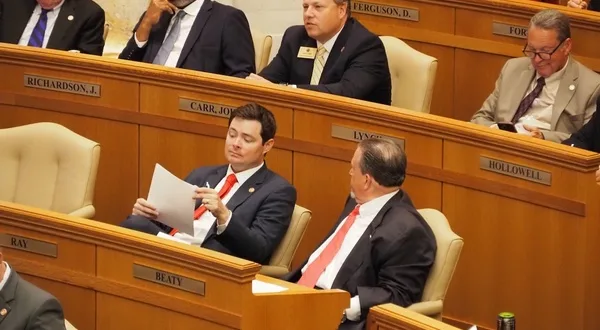
Rep. David Ray, R-Maumelle, scans paperwork during a special legislative session in Little Rock on June 17, 2024. Ray voted in support of tax cut bills as they moved through the House of Representatives. (Mary Hennigan/Arkansas Advocate)
Rep. David Ray, R-Maumelle, filed two tax-related bills Thursday that would increase individual taxpayers’ standard deduction and remove a cap on its annual adjustment.
House Bill 1066 would increase Arkansas’ standard deduction to $4,400 per taxpayer in 2026. The state’s current standard deduction is $2,340, well below the federal standard deduction of $14,600 for individuals or married taxpayers filing separately.
HB 1065, also known as the Inflation Reduction Act of 2025, would eliminate the 3% cap on adjusting the standard deduction in future years. The annual adjustment is tied to the Consumer Price Index (CPI), which the U.S. Bureau of Labor Statistics defines as the “average change over time in prices paid by urban consumers for a market basket of goods and services.”
Instead of using the CPI for All Urban Consumers to calculate the annual adjustment, the bill calls for referring to the CPI for West South Central division of the South Region published by the U.S. Department of Labor, which includes Arkansas, Louisiana, Oklahoma and Texas.
Increasing the standard deduction is “a solid move to make” in light of recent inflation and “a really broad-based way to deliver income tax relief to hardworking Arkansas families,” Ray said in an interview Friday.
The federal Tax Cuts and Jobs Act of 2017, passed during President Donald Trump’s first term, included a doubling of the standard deduction, which Ray said was “extremely popular.”
Ray said “one of the biggest lessons” from November’s presidential election, in which Trump won a second term, was that Americans want their elected leaders to reduce the impact of inflation.
“As one state representative out of 100, there’s very little I can do about the wasteful spending we see in Washington D.C. that drives a lot of the inflation, but the one thing I can do is file a bill that makes us adjust our tax brackets to truly account for inflation,” Ray said.
He also said the legislation will have “literally zero cost” if inflation rates are manageable in 2025, and it “would provide some really robust protections for taxpayers for the next time we get a nasty bout of inflation.”
Tax cuts have been a focus for Gov. Sarah Huckabee Sanders, who signed legislation to lower taxes for Arkansans three times over 15 months.
The Legislature approved more than $100 million in tax cuts in April 2023, reducing the top individual tax rate from 4.9% to 4.7% and the top corporate tax rate from 5.3% to 5.1%. During a special session in September 2023, legislators lowered the top individual and top corporate income tax rates to 4.4% and 4.8%, respectively.
The most recent cuts came during June’s special session during which lawmakers approved a bill to lower the top corporate income tax rate from 4.8% to 4.3% and the top individual income tax rate from 4.4% to 3.9%, retroactive to Jan. 1, 2024.
Ray co-sponsored all of those tax-cut bills. In addition to filing HB 1065 and 1066 for the 2025 legislative session that begins on Jan. 13, Ray has also filed HCR1002, a resolution urging the Congress to permanently extend the Tax Cuts and Jobs Act of 2017.
The law made several changes to the individual income tax, including an expanded tax deduction and child tax credit. The individual income tax changes are set to expire at the end of 2025. If made permanent, the income tax provisions would reduce federal revenue by $115 billion to $165 billion annually, according to the Tax Foundation.
To view this story, or more news updates from Arkansas Advocate, click here.
WebReadyTM Powered by WireReady® NSI










